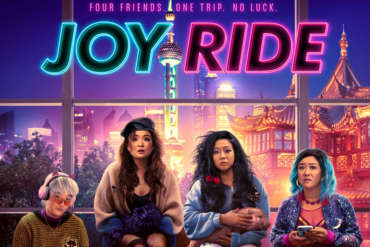Adele Lim’s “Joy Ride” is an exhilarating and entertaining movie that marks a promising directorial debut. Set in the vibrant year of 1998, the film takes us on a wild adventure fueled by a serendipitous encounter. The story revolves around Lolo (Milana Wan) and her family, who have recently relocated to the predominantly Caucasian community of White Falls in Washington state.
The film cleverly introduces us to the neighborhood and its residents through a fast-paced montage at a local playground. A seemingly innocent question from the Sullivans, a white family, sparks a heartwarming connection between Lolo’s family and their new neighbors. The interaction, brimming with humor, occurs when the Sullivans ask if they are Chinese, to which the Chens respond with a touch of sarcasm, emphasizing their English-speaking abilities and Californian roots.
What follows is a delightful journey of friendship between Audrey (Lennon Yee), the Sullivans’ Chinese adoptee daughter, and Lolo. As the only two Asian Americans in town, they become each other’s support system, offering solace and understanding in a community that often fails to provide diversity.
“Joy Ride” thrives on the strong bond between Audrey and Lolo, which serves as its foundation. The film proudly presents itself as a hilarious romp through the Asian diaspora, infused with the same raunchy humor found in beloved American studio comedies like “The Hangover” and “Bridesmaids.” In an effort to break down stereotypes and showcase underrepresented groups, Lim’s directorial debut fearlessly embraces a brash and rowdy narrative, much like the film “Bottoms” that premiered at SXSW alongside “Joy Ride.”
Lim’s direction injects the film with boundless energy, complemented by the brilliant performances of Ashley Park, Sherry Cola, Stephanie Hsu, and Sabrina Wu. The screenplay, skillfully crafted by sitcom veterans Cherry Chevapravatdumrong and Teresa Hsiao, takes the characters on absurd and hilarious misadventures, including frenetic decision-making, raunchy encounters, and uproarious impersonations.
As the story shifts to the present day, Audrey, now a successful corporate lawyer, embarks on a career-changing trip to China. This trip not only holds the key to her professional growth but also offers Lolo a chance to reignite their friendship. Joining them on this international escapade are Lolo’s cousin Deadeye (Sabrina Wu) and Audrey’s college best friend, Kat (Stephanie Hsu). The dynamic between the four friends is established in a club scene, where their contrasting personalities and relationships unfold with both humor and poignancy.
“Joy Ride” surprises viewers with its heartfelt moments and unexpected plot developments. The characters traverse China, encountering new acquaintances and reconnecting with long-lost family members. Lim’s lively direction, coupled with the genuine interest of Chevapravatdumrong and Hsiao in fleshing out each friend’s story, keeps the audience engaged and rooting for their favorite characters.
The film’s emotional impact extends beyond its entertainment value. It resonates with viewers on a personal level, as demonstrated by a moving moment during the Q&A session after the SXSW premiere. An audience member shared their own experience as a Chinese adoptee, revealing how “Joy Ride” allowed them to envision a closure they hadn’t experienced in real life. The heartfelt testimony received by the cast and the audience encapsulates the triumph of “Joy Ride” and its ability to touch lives through its authentic representation.
In an industry that often falls short on diversity, “Joy Ride” boldly showcases the power of unapologetic storytelling by marginalized groups, including women, people of Asian descent, and adoptees. The film challenges stereotypes and provides a platform for underrepresented voices to shine. It embraces the complexities of identity, culture, and belonging, while also delivering a hilarious and entertaining experience.
One of the film’s notable strengths is its exploration of the Asian diaspora experience. Through Lolo and Audrey’s characters, the movie delves into the challenges and triumphs of growing up in predominantly white communities, where they often feel like outsiders. It tackles issues of cultural assimilation, racism, and the search for identity in a lighthearted yet thought-provoking manner.
“Joy Ride” also shines a light on the bonds of friendship and the power of connection. The film depicts the deep and enduring friendship between Lolo and Audrey, which transcends time and distance. Their journey together in China not only strengthens their bond but also allows them to discover more about themselves and their shared heritage. The film beautifully captures the transformative power of friendship and the importance of having someone who truly understands you.
Additionally, “Joy Ride” showcases the talent and charisma of its diverse cast. Milana Wan and Lennon Yee deliver captivating performances as Lolo and Audrey, capturing the nuances of their characters’ experiences and bringing them to life with authenticity and charm. The supporting cast, including Ashley Park, Sherry Cola, Stephanie Hsu, and Sabrina Wu, adds depth and comedic brilliance to the film, creating a vibrant ensemble that keeps the audience engaged and entertained throughout.
As a directorial debut for Adele Lim, known for her work as a screenwriter on films like “Crazy Rich Asians,” “Joy Ride” demonstrates her skill in storytelling and her ability to infuse humor and heart into a narrative. Lim’s direction maintains a lively pace and combines visual flair with heartfelt moments, creating a captivating cinematic experience.
“Joy Ride” is more than just a comedy; it is a celebration of diversity, friendship, and self-discovery. It breaks barriers, challenges stereotypes, and offers representation that is long overdue in the film industry. With its blend of laughter, emotion, and cultural exploration, the movie leaves a lasting impact and serves as a testament to the power of inclusive storytelling.
Overall, “Joy Ride” is a delightful and empowering film that deserves recognition for its bold and unapologetic portrayal of Asian American experiences. It is a testament to the talent and resilience of marginalized voices in the film industry and a reminder of the importance of diverse and authentic storytelling.

